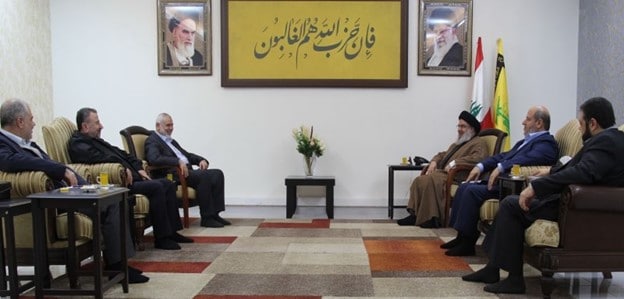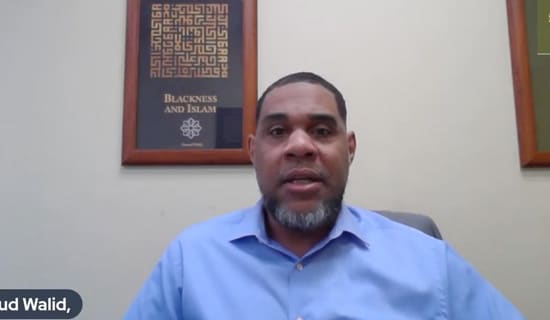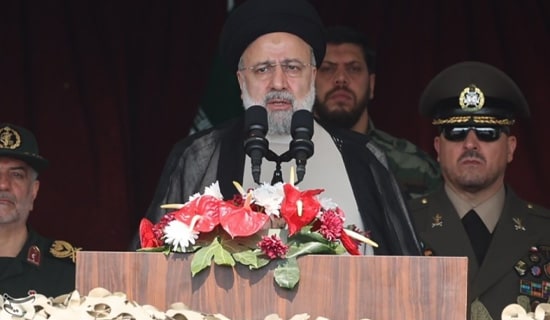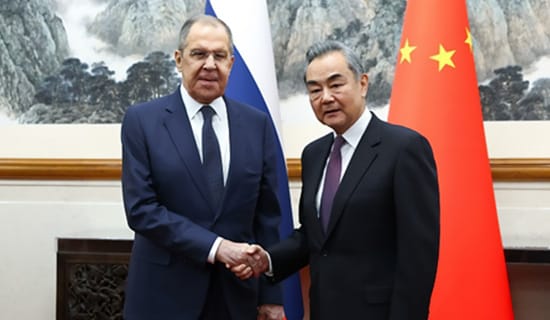On April 6, 2023, dozens of rockets were fired from South Lebanon into Israeli territory. This unusually large attack came amid an escalation in clashes between Israel and the Palestinians that took place during Ramadan and Passover. The rocket attack had apparently been planned in advance by the resistance axis, headed by Iran, with two main objectives. First, to drag Israel into a conflict on several fronts, and second, to convey a message, to Israel but also to other elements in the region, that the Iran-led resistance axis had been successful in its efforts to unite the resistance forces in the various arenas. These efforts apparently gained momentum in response to a call made by Hizbullah Secretary-General Hassan Nasrallah some two years ago. After the Israeli-Palestinian round of fighting in May 2021, Nasrallah urged the various armed militias to establish an equation whereby any aggression against Jerusalem will prompt a response on multiple fronts.[1]
To date, no element has claimed responsibility for firing the rockets. Hamas denied any connection to the attack, and Hizbullah initially hurried to distance itself from the incident and later adopted a policy of vagueness with regards to it. However, there are several indications that Hamas and Hizbullah were indeed behind the attack, apparently on Iran's orders. These indications include the scope of the attack, and the fact that the launch site was close to a Palestinian refugee camp in South Lebanon. Another indication is the extensive warming of relations that has taken place in the last few months between Hamas and Hizbullah, manifested in multiple meetings between high-ranking officials of the two organizations, the latest of which took place several days after the rocket attack.[2]
The firing of the rockets into Israel from South Lebanon drew harsh criticism in the country, both from officials, chief of them the Lebanese prime minister, and from politicians and columnists opposed to Hizbullah. They expressed concern that South Lebanon is turning into "Hamas-land," namely a base for Hamas operations against Israel, just as it served as a base for the PLO's operations in the 1970s and 1980s, with disastrous results for the country.

April 9 Meeting between Nasrallah, Haniya and associates (image: alahednews.com, April 9, 2023)
The following are some of the reactions to the firing of the rockets from Lebanon.
Hamas Denies Involvement In The Rocket Attack; Nasrallah Adopts A "Policy Of Silence"
As stated, Hamas hurried to deny any involvement in the firing of the rockets. Its representative in Lebanon, Ahmad 'Abd Al-Hadi, said that Hamas had "no information" about it, and noted that this is not the first time Israel has accused Hamas of attacking it with rockets from Lebanon.[3] As for Hizbullah, on the day of the attack a "Hizbullah source" told the Al-Arabi Al-Jadid daily that the organization was not responsible for firing the rockets.[4] However, several days later Nasrallah adopted a policy of vagueness regarding the incident. In his Qods Day speech on April 14, 2023, he said that, following consultations and debates, it had been decided to adopt "a policy of silence" on the firing of the rockets, a policy which unsettles Israel. Regarding the discomfort caused by this policy among Hizbullah's "friends," Nasrallah said that these friends "must see this as part of the sacrifice [demanded by] this war," and added that "there are other ways to allay their concerns."[5]
However, these denials apparently made little impression on Hizbullah's opponents in Lebanon, who voiced considerable concern that their country would be dragged into another war with Israel and that South Lebanon is turning into "Hamas-land."
Lebanese Politicians Call To Ban Hamas Activity In Lebanon, Prevent All Activity That Destabilizes The Country
Lebanon's interim prime minister, Najib Mikati, at first firmly condemned the firing of the rockets. In a reception he held for Italian Defense Minister Guido Crosetto, he said that Lebanon "completely opposes any military escalation from its territory and the use of its territory for activity that undermines its stability." He added that the Lebanese armed forces and UNIFIL were investigating the incident in order to arrest those responsible.[6] Several days later, however, Mikati softened his tone. He said that "non-Lebanese elements" were responsible for the attack and dismissed the possibility that "organizational elements," i.e., Hamas or Hizbullah, were behind it. He even justified the firing of the rockets, calling it "a response to the Israeli aggression on Palestinian soil and in the Gaza Strip."[7]
Harsher criticism was voiced by Lebanese former prime minister Fouad Al-Siniora, who called to keep Lebanon from becoming a base for firing rockets at Israel, especially without the consent of the Lebanese government and the Lebanese people. He said that this contravenes UN Security Council Resolution 1701, endangers Lebanon and further aggravates its problems. Al-Siniora also warned that rocket attacks serve the interests of Israel, which is experiencing internal disputes and division, because they are likely to unite the country in the face of an external threat.[8]
Several Lebanese politicians urged taking action against Hamas, which they viewed as responsible for the rocket attack. Elie Mahfoud, head of the Lebanese Change Movement, called to close Hamas' offices throughout Lebanon, both inside and outside the refugee camps, to ban the movement's activity on Lebanese soil and expel its operatives, and to declare Hamas an organization hostile to Lebanon. He mocked Hizbullah's claim that it had not known in advance about the rocket attack and urged that Nasrallah be summoned for questioning on this matter.[9]
SUPPORT OUR WORK

Criticism was heard even from Gebran Bassil, head of the Free Patriotic Movement, who is considered an ally of Hizbullah. He said: "Had we been unable to defend our own country, it might have been [legitimate] to seek other solutions. But, given that we have demonstrated our ability [to defend it], why should we allow a non-Lebanese element to fire rockets from our territory[?]… The Cairo Agreement[10] is dead, Fatah-land no longer exists. We don't need any foreign element to use our territory to convey [various] messages. We will not allow any weapons that are not in Lebanese hands. We want our country to ourselves… We don't need anyone to come from outside to liberate our land or defend it. There are periods in our history that we must learn from and not repeat."[11]
Lebanese Journalists: South Lebanon May Become "Hamas-Land"
Similar claims were made by Lebanese columnists in papers opposed to Hizbullah. American-Lebanese journalist Raghida Deghram, for example, wrote in her column in the daily Al-Nahhar: "Hamas has no right to retaliate against Israel's unrestrained behavior in Al-Aqsa by using South Lebanon as a launch pad for its rocket attacks on Israel. These actions by Hamas are, first of all, a violation of Lebanon's sovereignty. In addition, they disregard the right of the Lebanese people to make their own decisions, as well as the right of the Palestinian people to receive sympathy and support, instead of [just] venting their anger and incurring anger through these wretched escapades of Hamas'. Hamas Political Bureau head Isma'il Haniya has no right to conduct these reckless [attacks] in revenge against Israel from [the territory of] Lebanon and of its people, which is in a tragic state of collapse. Hizbullah Secretary-General Hassan Nasrallah certainly has no right to drag Lebanon into a war on orders from Iran's [Islamic] Revolutionary Guards [Corps], or to sit with Isma'il Haniya on the very day [sic] of the 'Palestinian' rocket attack [launched] from Lebanese soil, and thus take us back to the [days of] 'had I known.'[12]
"This is not resistance, but rather [part of] an intra-Palestinian power-struggle. It is also an Iranian message whose gist is that the only element that reacts to Israel's criminal attacks on the Al-Aqsa mosque is the Islamic Republic [of Iran]. But [in practice], the main reason for [this move by] the leaders of Tehran is the Israeli attacks on the Iranian positions in Syria. [The Iranians] surely knew in advance about the 'Palestinian' rockets, which were launched from the 'Lebanese front' in order to cover [the Iranians'] helplessness in the 'Syrian arena.' And if they did not know in advance, that is even worse… Today, Tehran is no longer able to widen the scope of the confrontation with Israel to include a direct confrontation on the Syrian front, as it once threatened to do… Iran after the tripartite Chinese-Saudi-Iranian agreement[13] is not the country it was before this agreement, which limits its military appetite. As a result, it was forced to resort to its favorite alternative, which is to take revenge on Israel by means of its proxies, including Hizbullah in Lebanon and Hamas in Gaza, and to unite the resistance arenas, or use them as required by the developments…"
In response to Hizbullah's attempt to deny any involvement in the launching of the rockets, Deghram stressed that, "unfortunately for Mr. Hassan Nasrallah, he decided to meet with Mr. Isma'il Haniya while the latter's rockets were being fired from South Lebanon. [That region is] Nasrallah's own lions' den, and we assume even a fly cannot move there without his prior consent. So there are only two options: either he granted his permission in advance, or he was surprised. Both alternatives reflect badly on his performance and his commitment to his promises…
"Ultimately," Deghram concluded, "the decision [to launch the rockets] was a bad one, since it harmed the Palestinians and the Lebanese in equal measure, exposed the Iranian frustration and caused Hizbullah embarrassment on its home court. We should ask why the Palestinian factions, and especially Hamas, have these all rocket capacities in Lebanon, when they presumably need them in Palestine in order to wage serious resistance against Israel, instead of hesitant maneuvers that ultimately serve Israel."
Deghram argued that the Cairo Agreement, which sanctioned the armed Palestinian presence in Lebanon, is the root of the disaster, and wondered, "How can an independent state allow an armed presence outside its control to exist on its soil, assuming that it is really a state in the full sense of the word? [The existence of] Hizbullah's weapons justifies [the existence of] Hamas' weapons in Lebanon, outside the control of the state, which is a flagrant violation of its sovereignty. Hizbullah is a Lebanese element that is entitled to be part of the national decision-making but not to usurp it…"
Deghram concluded that "Hamas provides Israel with excuses, whether deliberately or out of stupidity. We must be careful not to fall into the trap of Israel's systematic extremism."[14]
Other columnists also expressed concern about Hamas' growing military strength in Lebanon and the possibility that it will start operating against Israel from South Lebanon, as the PLO did in the 1970s and 1980s. In an article on the "This Is Lebanon" website, Jean Feghali wrote: "It's as if we have gone back in time 50 years or more, specifically to 1969, when the term 'Fatah-land' became current, [because] the Palestinian Fatah movement had turned South Lebanon into a base for its operations against Israel. The Cairo Agreement, signed by the Lebanese government and the PLO under the aegis of Egypt, did not bring about an end to this activity… Fifty-four years after the Cairo Agreement and Fatah-land, South Lebanon has again become a rocket launch-pad – this time not for Fatah but for Hamas. The south has become Hamas-land. Despite the essential changes that have taken place in the Lebanese and Palestinian reality, one fact remains true, namely that South Lebanon is still outside the control of the Lebanese state."
Feghali listed three changes that have occurred since the 1970s and 1980s. First, South Lebanon is now under the complete control of Hizbullah, and nothing happens there without its knowledge and permission. Second, Lebanon and Israel have signed an agreement on the maritime borders, and the rocket attack had thus jeopardized the Lebanese natural gas project more than anything else, by undermining Lebanon's security. The third change is that Lebanon is on the brink of bankruptcy, and cannot afford a war with Israel. Feghali concluded that "Lebanon is still the weak link, due to the existence of islands where security is not under its control – whether we call them Hamas-land, 'security islands' or 'security zones'…"[15]
[1] On Nasrallah's call and the responses to it, see MEMRI JTTM reports: Hizbullah Brigades: Responding To Nasrallah's Call For A New Equation That A Threat To Jerusalem Equals Regional War, June 17, 2021; Al-Nujaba Spokesman: Golan Liberation Brigade Is Ready For Action; Any Violation In Jerusalem Will Lead To Attacks On Israeli, U.S. Interests In Region, June 16, 2023.
[2] On Haniya's recent visit to Beirut, see MEMRI reports: Special Dispatch No. 10562, Lebanese Media Reports: On The Evening Before The April 6, 2023 Rocket Attack On Israel, Iranian Qods Force Commander Esmail Qaani Visited Lebanon, Met With Officials From Hizbullah, Hamas, Palestinian Islamic Jihad, April 13, 2023; Special Dispatch No. 10100, Hamas Political Bureau Head Isma'il Haniya's Visit To Lebanon Sparks Criticism In Country: He Is Embroiling Lebanon In Regional Conflicts In Service Of Iran, July 27, 2022.
[3] Al-Nahhar (Lebanon), April 6, 2023.
[4] Al-Arabi Al-Jadid (Lebanon), April 6, 2023.
[5] Alahednews.com.lb, March 14, 2023.
[6] Al-Nahhar (Lebanon), April 6, 2023.
[7] Al-Nahhar (Lebanon), April 9, 2023.
[8] Lebanese_forces.com, April 1, 2023.
[9] Nidaalwatan.com, April 8, 2023.
[10] The Cairo Agreement, signed on November 2, 1969 between the PLO and the Lebanese government, permitted the PLO to operate from Lebanese soil.
[11] Al-Akhbar (Lebanon), April 12, 2023.
[12] The reference is to Nasrallah's well-known remark following the 2006 devastating war with Israel. Nasrallah said that, had he known Israel would respond with such force, he would not have kidnapped the Israeli soldiers (the incident that led to the war).
[13] On the agreement recently signed by Iran and Saudi Arabia with Chinese mediation, see MEMRI Special Dispatch No. 10522, In Saudi Press, Cautious Optimism Follows Saudi-Iranian Renewal Of Relations, March 13, 2023.
[14] Al-Nahhar (Lebanon), April 9, 2023.
[15] Thisislebanon.com, April 8, 2023.




